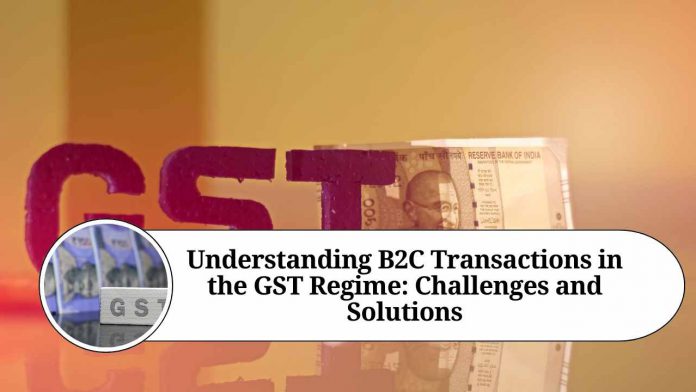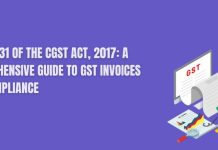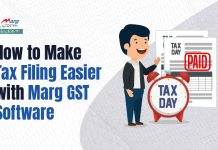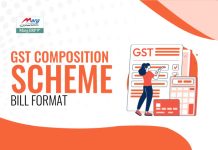INTRODUCTION
One of the key components of GST is the classification of taxpayers into B2B and B2C. B2B refers to businesses that sell goods or services to other businesses, while B2C refers to businesses that sell goods or services to consumers. In this blog, we will discuss B2C in GST.
B2C transactions are those where the end consumer purchases goods or services directly from the supplier. These transactions are typically carried out by retailers or e-commerce platforms. B2C transactions in GST are taxed at a different rate than B2B transactions.
In GST, there are four tax rates applicable to B2C transactions: 0%, 5%, 12%, and 18%. The 0% rate applies to essential items like food grains, fresh fruits and vegetables, and milk. The 5% rate applies to items like apparel up to Rs. 1000, footwear up to Rs. 500, and packaged food items. The 12% rate applies to items like apparel above Rs. 1000, frozen meat products, and cell phones. The 18% rate applies to items like aerated drinks, luxury cars, and tobacco products.
Businesses that sell goods or services to consumers need to register under GST if their annual turnover exceeds Rs. 40 lakhs. If they sell goods or services in more than one state, they need to register under GST irrespective of their turnover. Once registered, they need to file monthly or quarterly returns depending on their turnover.
B2C businesses need to issue a tax invoice for every transaction, irrespective of the value of the transaction. The tax invoice should include details like the name and address of the supplier, the name and address of the recipient, the GSTIN of the supplier, the invoice number, the date of the invoice, a description of the goods or services supplied, the number of goods or services supplied, the taxable value of the goods or services supplied, and the tax rate and amount.
B2C businesses are also required to pay GST on a reverse charge basis for certain transactions. A reverse charge means that the recipient of the goods or services is liable to pay GST instead of the supplier. This is applicable in case of goods or services purchased from an unregistered dealer or for certain specified goods or services like legal services, director’s services, etc.
B2C transactions in GST have a significant impact on the Indian economy. With the implementation of GST, businesses now have a level playing field, and the tax burden has been distributed fairly among taxpayers. B2C businesses, in particular, have benefitted from GST as it has simplified the tax structure and reduced the compliance burden.
One of the major advantages of GST for B2C businesses is the availability of input tax credits. Under the GST regime, businesses can claim the input tax credit on the tax paid on purchases made for their business. This means that businesses can reduce their tax liability by deducting the tax paid on their purchases from the tax collected on their sales.
Another advantage of GST for B2C businesses is the simplification of compliance procedures. Previously, businesses had to comply with multiple indirect tax laws, which were complex and time-consuming. With GST, the compliance procedures have been simplified, and businesses only need to file one GST return every month or quarter, depending on their turnover.
B2C businesses have also benefitted from the introduction of e-way bills. An e-way bill is a document that needs to be generated when goods are transported from one place to another. This document needs to be carried out by the person in charge of the transportation of the goods. E-way bills have reduced the time taken for the transportation of goods and have made the process more efficient.
However, B2C businesses also face some challenges under the GST regime. The biggest challenge for B2C businesses is the high rate of GST on certain items. For example, the GST rate on luxury cars is 28%, which makes them significantly more expensive. This has impacted the sales of luxury cars and has affected the automobile industry.
conclusion
B2C transactions are an important component of the GST regime, and businesses need to comply with the necessary tax laws and regulations. GST has simplified the tax structure and reduced the compliance burden for B2C businesses. However, businesses also face challenges under the GST regime, and the government needs to address these challenges to ensure the growth of the Indian economy.
Other Related Blogs: Section 144B Income Tax Act
Here are some frequently asked questions (FAQs) related to B2C transactions in GST:
Q.What is GST?
GST stands for Goods and Services Tax, which is a comprehensive indirect tax levied on the supply of goods and services in India.
Q.What is a B2C transaction?
A B2C transaction refers to a business selling goods or services directly to consumers. This is in contrast to a B2B transaction, where businesses sell goods or services to other businesses.
Q.What is the GST rate applicable to B2C transactions?
The GST rate applicable to B2C transactions varies depending on the type of goods or services being sold. The rates can range from 0% to 28%.
Q.Can B2C businesses claim an input tax credit under GST?
No, B2C businesses cannot claim an input tax credit under GST as they do not make taxable supplies to other businesses.
Q.What is an e-way bill?
An e-way bill is a document that needs to be generated when goods are transported from one place to another. This document needs to be carried out by the person in charge of the transportation of the goods.
Q.Are B2C businesses required to file GST returns?
Yes, B2C businesses are required to file GST returns. They need to file one GST return every month or quarter, depending on their turnover.
Q.What is the anti-profiteering clause under GST?
The anti-profiteering clause is designed to ensure that the benefits of GST are passed on to consumers in the form of lower prices. Businesses need to comply with this clause and ensure that they do not increase their profit margins due to the implementation of GST.
Q.What is the impact of GST on consumer behavior?
With the implementation of GST, consumers are more conscious of the tax they pay on goods and services. This has led to a change in their purchasing behavior, and they now prefer to buy goods or services that are taxed at a lower rate. This has impacted the sales of goods or services that are taxed at a higher rate.




















